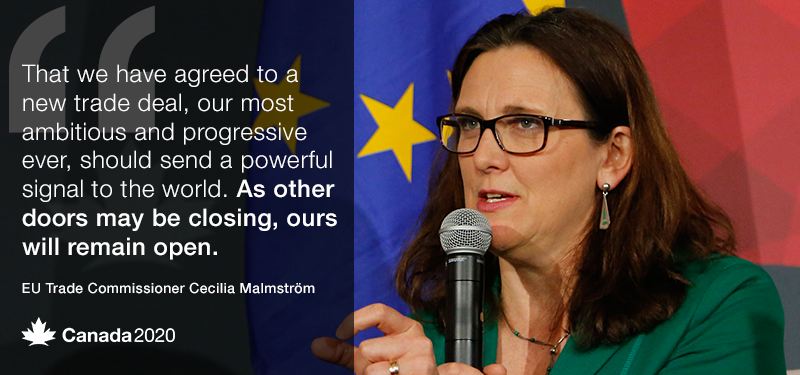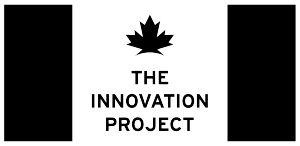
Canada 2020 released Volume One of its Innovation Project Towards an Inclusive, Innovative Canada in February, 2017. Its authors, Mike Moffatt, Hannah Rasmussen and David Watters examined innovation in Canada through various sectors, and how to measure it. Moffatt and Rasmussen developed Ten Big Ideas to Drive Innovation in Canada.
In writing this volume, Moffatt and Rasmussen wrote that their mission is:
“to increase innovation in Canada by creating a set of Big Ideas, which, if enacted, would have measurable results, whose benefits would be well understood, and that would increase the economic well-being and personal autonomy of the middle class and those working hard to join it.”
With this mission in mind, we examined the government of Canada’s 2017 federal budget and found six examples of inclusive innovation.
1. ACCELERATING INNOVATION THROUGH SUPERCLUSTERS
From the budget:
Successful  clusters like the ones in Silicon Valley, Berlin, Tel Aviv and the Toronto-Waterloo corridor contribute significantly to both regional and national economies.
clusters like the ones in Silicon Valley, Berlin, Tel Aviv and the Toronto-Waterloo corridor contribute significantly to both regional and national economies.
Budget 2017 proposes to invest up to $950 million over five years, starting in 2017–18, to be provided on a competitive basis in support of a small number of business-led innovation superclusters that have the greatest potential to accelerate economic growth. The competition will launch in 2017 and focus on superclusters that enhance Canada’s global competitiveness by focusing on highly innovative industries such as clean technology, advanced manufacturing, digital technology, health/bio-sciences, clean resources and agri-food, as well as infrastructure and transportation.
Our Analysis:
This is an interesting idea – in Towards an Innovative, Inclusive Canada, Moffatt and Rasmussen were also thinking about driving innovation through superclusters. They suggested that academia and research could play a role in driving innovation. In one of their Ten Big Ideas to Drive Innovation in Canada, they proposed creating research clusters of knowledge in universities. Here is their recommendation:
The federal government should fund the creation of a network of cluster research centres across the country at universities within the geographic area of the cluster that would be required to provide a yearly set of deliverables to maintain their funding.
In addition, Moffatt and Rasmussen suggested thickening labour markers in medium-sized cities, outside of major urban centres and clusters like Toronto, Montreal and Vancouver. They suggested the government had an opportunity to grow clusters in medium-sized cities which would allow for the emergence of clusters in these cities.
2. SUPPORTING CANADIAN INNOVATORS THROUGH VENTURE CAPITAL
From the 2017 Budget:
To support the continued growth of Canada’s innovative companies, Budget 2017 proposes to make available up to an additional $400 million through the Business Development Bank of Canada on a cash basis over three years, beginning in 2017–18, for a new Venture Capital Catalyst Initiative that will increase late-stage venture capital available to Canadian entrepreneurs (late-stage venture capital is typically offered to young, established businesses with sales and revenue, in order to help the businesses grow).
With funds leveraged from the private sector, and depending on the proposals received, this investment could inject around $1.5 billion into Canada’s innovation capital market.
Our analysis:
As we traveled the country for our research groups, one comment we heard repeatedly was a lack of Canadian investment by way of venture capital for Canadian companies.
However, there is another side to investment in Canada’s emerging companies, and that is cultural. One participant in our Financial Services roundtable in Toronto talked about the cultural barrier to innovation – that is an adversity to taking risks.
Following our Financial Services roundtable in July 2016, Moffatt wrote in our innovation report, “A concern was raised that Canadian investors and managers may be too risk averse to be full participants in a highly innovative industry. As one participant put it, “[In Canadian MBA programs] there’s not a lot on how to take risk … . In [New York], the mentality of grads out of the U.S. is to take risks. There’s an acceptance that if you do that and fail that’s OK. In Canada, there’s stigma around failure.”
A suggestion was made that foreign investors from countries with higher appetites for risk, such as China, may be able to fill some of the financial (but not necessarily managerial) gaps.
It’s Canada 2020’s hope that the additional $400M outlined in the government’s federal budget will spur investment from other sectors also.
3. CANADA 150 RESEARCH CHAIRS
From the 2017 Federal budget:
In recognition of the importance of research excellence and in celebration of Canada’s 150th anniversary, approximately 25 Canada 150 Research Chairs will be created to attract top-tier international scholars and researchers to Canada and enhance Canada’s reputation as a global centre for innovation, science and research excellence. Budget 2017 proposes to invest $117.6 million over eight years for these new chairs, funded with resources within the existing Canada Excellence Research Chairs program.
Our analysis:
As part of their 10 Big Ideas to Drive Innovation in Canada, Moffatt and Rasmussen created the concept of a ‘Canada 150 Goals’ and ‘Canada 150 Prizes.’
They wrote that innovative thinking can solve some of the more difficult social and economic problems the country faces, such as a lack of safe drinking water and substandard housing on First Nations reserves, a persistently large gender wage gap and growing rates of fentanyl and other opioid addiction.
The suggested the use of goals and prizes, which we have adapted from both the XPrize Foundation and the United Nations Millennium Development Goals.
Their Recommendation was that the federal government identify a set of measurable national goals, the Canada 150 Goals. In addition, the federal government should create a set of Canada 150 Prizes, with large cash prizes for projects that will help meet these goals.
4. IMPROVING THE TEMPORARY FOREIGN WORKER PROGRAM AND INTERNATIONAL MOBILITY PROGRAM
From the budget:
As announced in the 2016 Fall Economic Statement, the Government will launch a Global Skills Strategy to facilitate faster access to top global talent for companies doing business in Canada that are committing to bring new skills to Canada and create more Canadian jobs.
The Global Skills Strategy will set an ambitious two-week standard for processing visas and work permits for global talent.
Building on funding announced in the 2016 Fall Economic Statement, Budget 2017 proposes to provide an additional $7.8 million over two years, starting in 2017–18, to implement a new Global Talent Stream under the Temporary Foreign Worker Program, as part of the Global Skills Strategy.
Also under the Global Skills Strategy, the Government will introduce a new work permit exemption for short-duration work terms. The short-duration work permit exemption will apply for work terms of fewer than 30 days in a year—or for brief academic stays—and will be used for short-term, inter-company work exchanges, study exchanges or the entrance of temporary expertise.
Our Analysis:
Participants at our Financial Services roundtable noted the difficulty of bringing in foreign expertise in their sector. Indeed, we were told that if there are talent (or cultural) gaps in the system, immigration might offer an answer.
However, one roundtable participant noted that it takes so long to bring executive-level talent into Canada under the Temporary Foreign Worker Program that a candidate will have typically moved on to other opportunities by the time their application is approved.
Canada 2020 is happy to see that continued improvements have been made to this program, and hopes that it will bring more talent into Canada in the future.
5. SUPPORTING INNOVATION IN KEY GROWTH INDUSTRIES
From the budget:
Budget 2017 supports innovation in key growth industries—clean technology, digital and agri-food—with new measures that will improve access to financing, encourage investment, support the demonstration of technologies and build the capacity necessary for Canadians to take advantage of growth opportunities and create good, well-paying jobs.
Budget 2017 includes a particular focus on the clean technology sector, proposing more than $2.2 billion, on a cash basis, to support clean technology research, development, demonstration and adoption as well as to accelerate the growth of clean technology companies. This includes making available nearly $1.4 billion in new financing on a cash basis over three years, starting in 2017–18, through the Business Development Bank of Canada and Export Development Canada.
Our analysis:
Moffatt writes in Canada 2020’s report Towards and Inclusive, Innovative Canada that Canada is one of the world’s leaders in the production and use of renewable energy. In 2012, renewable energy represented 17 per cent of Canada’s total energy supply. This was a dramatic increase from a decade earlier. In addition to supplying Canadians with electricity, renewables play an important role in our trade with the U.S. Several provinces are net exporters of hydro-generated electricity to the U.S.
Members of Canada 2020’s Clean Technology and Renewables roundtable, held in August, 2016 in Vancouver, would likely applaud this financial support, but would probably re-iterate the need to grow companies beyond the initial stages.
One participant at our roundtable felt that government financing programs were quite useful for the ear¬ly stages of product development, but not for obtaining financing for commercialization. He said that “Sustainable Development Technology Canada is terrific for early stage innovation,” and cited government support through the Scientific Research and Experimental Development Tax Incentive, the National Research Council Canada, the Industrial Research Assistance Program, and others.
“There’s a lot of baked-in support before it gets to commercialization. There is help from the public sector to get across the ‘valley of death.’” he said. Then he added, “But when you get to the first market entrant, there is not a lot of debt financing or private capital. These companies are light on assets, so banks won’t lend to them. So companies, even if they do make it across the ‘valley of death,’ do not have the necessary assets or financing to commercialize.”
6. TEACHING KIDS DIGITAL SKILLS AND CODING
From the budget:
To ensure that young Canadians are well prepared for the way digital technologies will impact future jobs all across the labour market, Budget 2017 will invest $50 million over two years to support organizations delivering digital skills training to girls and boys from kindergarten to grade 12.
Our analysis:
In Towards an Inclusive, Innovative Canada, Moffatt and Rasmussen suggest that early education include numeracy, before moving to digital skills and coding. As one of their 10 Big Ideas to Drive Innovation in Canada, Big Idea 7 is to Create a National Numeracy program that introduces numeracy skills in early childhood education.
They quote a 2012 study by the Conference Board of Canada that found that 55 per cent of Canadian adults had inadequate numeracy skills. Also, inadequate numeracy skills are higher in marginalized groups, such as Aboriginal people in Canada and immigrants. A person with inadequate numeracy skills may be unable to function well in an innovative Canada as low numeracy skills are linked to unemployment, low wages and poor health.
Moffatt and Rasmussen write, “Poor numeracy is a massive challenge for Canada’s innovation agenda and our goal of encouraging economically inclusive innovations.
The goal for this big idea is to build on measures proposed and/or put in place by other countries struggling with the same numeracy issues in order to eradicate inadequate numeracy among adults and children, and to create more positive attitudes towards numeracy in Canadian society.”
Download Towards an Inclusive, Innovative Canada


 clusters like the ones in Silicon Valley, Berlin, Tel Aviv and the Toronto-Waterloo corridor contribute significantly to both regional and national economies.
clusters like the ones in Silicon Valley, Berlin, Tel Aviv and the Toronto-Waterloo corridor contribute significantly to both regional and national economies.


